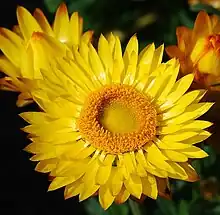Xerochrysum bicolor
Xerochrysum bicolor is a flowering plant in the family Asteraceae, native to Tasmania, where it is found in wetter habitats near the coast. It was originally described by Lindley in 1835 as Helichrysum bicolor,[1] before gaining its current name in 2001.[2]
| Xerochrysum bicolor | |
|---|---|
 | |
| Scientific classification | |
| Kingdom: | Plantae |
| Clade: | Tracheophytes |
| Clade: | Angiosperms |
| Clade: | Eudicots |
| Clade: | Asterids |
| Order: | Asterales |
| Family: | Asteraceae |
| Genus: | Xerochrysum |
| Species: | X. bicolor |
| Binomial name | |
| Xerochrysum bicolor (Lindl.) R.J.Bayer | |
It is a compact annual or perennial, which normally grows to about 40 cm in height and 50 cm wide, and is usually simple or few-branched. The leaves are lanceolate and range from 2.5 to 10 cm long by 0.3 to 1.4 cm wide. The flowerheads are on stalks and have a diameter of 3 to 4 cm. The inflorescence bracts are papery, the outer ones orange-brown in colour, and the inner ones yellow. It is distinguished from Xerochrysum bracteatum by its narrower leaves.[3]
The species may be sunk into X. bracteatum in a future revision.[3]
References
- "Helichrysum bicolor Lindl". Australian Plant Name Index (APNI), IBIS database. Centre for Plant Biodiversity Research, Australian Government.
- "Xerochrysum bicolor (Lindl.) R.J.Bayer". Australian Plant Name Index (APNI), IBIS database. Centre for Plant Biodiversity Research, Australian Government.
- Australian Daisy Study Group; Barker, Judy; Greig, Joy; Peate, Natalie; Courtney, Bev; Salkin, Esma; Schaumann, Maureen; Armstrong, John; Thomlinson, Gloria (2002). Everlasting Daisies of Australia. Melbourne, Australia: Shannon Books. p. 57. ISBN 0-9587439-6-7.